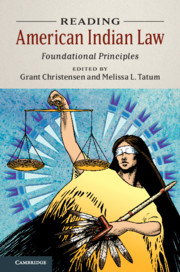Book contents
- Reading American Indian Law
- Reading American Indian Law
- Copyright page
- Dedication
- Contents
- Editors and Contributors
- Preface
- Acknowledgments
- Introduction
- Part I Core Concepts
- Part II Voices
- Part III Property
- 9 Sovereignty and Property
- 10 The Legacy of Allotment
- 11 A Common Law for Our Age of Colonialism: The Judicial Divestiture of Indian Tribal Authority over Nonmembers
- 12 In Defense of Property
- Part IV (Mis)Understandings
- Book part
- References
10 - The Legacy of Allotment
from Part III - Property
Published online by Cambridge University Press: 11 December 2019
- Reading American Indian Law
- Reading American Indian Law
- Copyright page
- Dedication
- Contents
- Editors and Contributors
- Preface
- Acknowledgments
- Introduction
- Part I Core Concepts
- Part II Voices
- Part III Property
- 9 Sovereignty and Property
- 10 The Legacy of Allotment
- 11 A Common Law for Our Age of Colonialism: The Judicial Divestiture of Indian Tribal Authority over Nonmembers
- 12 In Defense of Property
- Part IV (Mis)Understandings
- Book part
- References
Summary
The Legacy of Allotment: explores the ways in which the federal courts have used the consequences of the federal policy of allotment and assimilation in modern court decisions, despite the fact that Congress officially repudiated the policy in 1934. The US Supreme Court has relied on various aspects of the allotment policy in its decisions diminishing Indian country and reducing the sovereign authority of tribal governments. Royster’s article demonstrates that the Supreme Court’s actions have been contrary to the Court’s own precedents and have usurped congressional authority over Indian affairs.
- Type
- Chapter
- Information
- Reading American Indian LawFoundational Principles, pp. 238 - 261Publisher: Cambridge University PressPrint publication year: 2019
References
Further Reading
- 1
- Cited by

